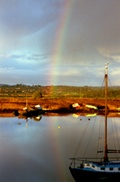
July 2000
Melanesia in Topsham
Solomon Islands and Topsham, Devon 22 July 2000 Our friends Alex and Lynn Leger called and asked us over for a bbq and ‘to meet some friends’. They were entertaining, Alex explained, a group of Melanesian monks, over from the Solomon Islands as guests of the Bishop of Exeter. Alex had been in the Solomon Islands some 34 years ago as a VSO worker and had taught the relatives of many of the monks. We went along not knowing quite what to expect but aware that the occasion was likely to be extraordinary.
The evening was fine, a bit overcast, not overly warm, but dry all the same. At the bottom of his garden, Alex had dug a big pit, created a hearth and set a log fire burning. When we arrived, the Solomon Islanders were mainly sitting around the fire on bales of hay, some of them barefoot, others in fleeces to keep warm, most wearing beautiful fish tooth necklaces. There were also about 30 friends of the Legers there, including Bishop Michael of Exeter, as well as Richard, our local vicar.
Our great friends David and Ondine, the fisherman/chefs who had cooked the scallops and fish at our recent Nello pasta feast, were cooking again over charcoal. There was wonderfully fresh red mullet, simply wrapped in vine leaves and gently grilled over hot coals. A trawlerman friend of David's had given him some squid which he marinated briefly in lime juice, then quickly cooked over charcoal, incredibly seafresh, tender yet toothsome at the same time. Salmon steaks, lamb chops and sausages, sizzled on the grill, too.
Meanwhile Mrs. Kate Pwaisiho, wife of Bishop Willy of Melanesia (who Alex had taught all those years ago), made a gorgeous Solomon Islands soup out of sweet potatoes, pumpkin, broad beans, runner beans, and kasava, all stewed gently in coconut milk. That wonderful soup, so different from anything we’d ever cook ourselves, was at once earthy, simple, delicious and sweetly sustaining. It warmed and nourished us all to the bone, and drew us into another, unknown culture and world through its vivid taste.
It was the most idyllic, almost magical evening: we sat outside on the bales of hay or on the ground, and we ate, and we drank wine or beer, and we talked and talked. And the Brothers described their wonderful (and to me) totally unknown corner of this earth where they live, on an archipelago of some 1700 islands where some 700 different languages are spoken, with pidgin english the only common language. Names of places such as Honiara and Isabel Island were completely new to me. Brother Stephen, who loves fishing, vividly described how you can come across clusters of perhaps a hundred islands (the tips of submerged volcanos), all uninhabited, where small paddled fishing boats can go, weaving through a maze of rocky channels, the way out of which, if you do not know, you will never find! It was a remarkable evocation of rare and strange and wonderful places on this earth: just as, for the Brothers, being in England, sitting around a fire on a cool summer evening in Devon must have been for them. Most if not all of them had never set foot outside of the Solomon Islands before.
Music plays a large part in the lives of the Melanesians and thus, as the sun went down and another log was thrown onto the fire, the Brothers entertained us with song and dance, and played their handmade instruments: outrageous, magnificent bamboo pan pipes that ranged in size from tiny to immense (2 metres high). The small pipes were blown with the mouth, while the bigger ones were beaten like percussion instruments with the soles of disused flip-flops. The music was so pure, at once innocent, melodic, beautiful: it evoked among us a sense of a simpler other life, another world, actually, and the brothers danced and moved with the music in a way that was so at one, with the evening, with a spirit of brotherhood, with a sense of joy and wonder simply at being alive. Later, afterwards, the Brothers delighted in showing Guy, Bella and the other children how to play the instruments, teaching them how to beat out rhythms and melodies that were simply beautiful.
The next morning we went to Exeter's magnificent 12th century cathedral where the Brothers were singing as part of the Sunday communion service. It was really quite amazing: within that immense and solid gothic stone space that has stood for so many centuries, the Brothers danced proudly and unselfconsciously through the main doors to a packed and amazed congregation. They were dressed in their native costume, wearing white skirts, barechested and barefoot, their bodies painted with white ash decorations, and with sprigs of pine in their headbands. They wove and danced their way down the aisle towards the altar, beating time with barefeet, as they blew and beat those magnificent pan pipes!
Apparently a clergyman from Exeter, Bishop Patteson, in the last century had gone out to Melanesia as a missionary and was martyred there. His death laid the seeds for evangelistic Christianity within the island communities. The Brothers returning to Exeter brought that event full circle, and so it was very moving to see them within both a day-to-day and historical context.
It made us all aware of what a tiny and amazing world we live in; that indeed both time and place can be contiguous; and that, as the Brothers sang and chanted, 'We are all one family'.
A reminder for us too that food is not all that sustains.
![]()
|Home| |QP New Media| |Kim's Gallery|
![]()
Copyright © Marc and Kim Millon 2000
![]()
